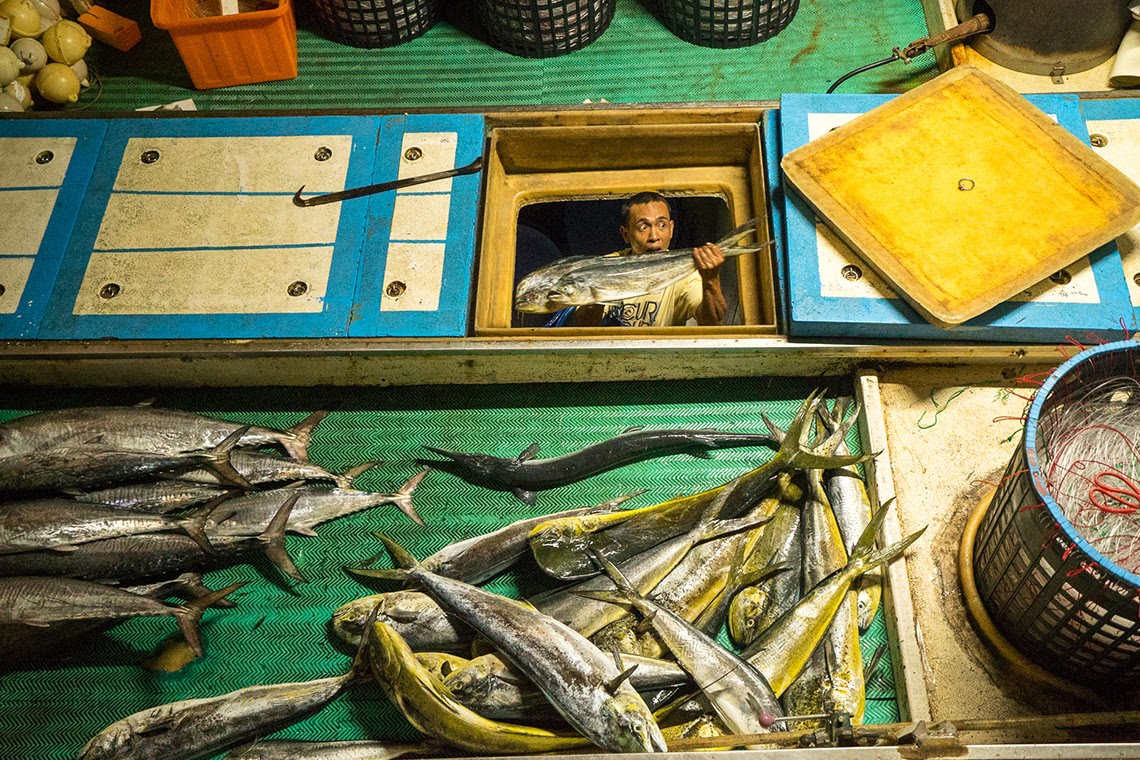U.S-China trade war, day one
The China Project Access newsletter on the start of the first great Sino-American trade war of the 21st century.

1. Trade war, day one
“Trump’s trade war with China is officially underway” screams today’s New York Times. The Chinese Ministry of Commerce said it will be “the biggest trade war in economic history.”
- Global markets are stable, so far: “Wall Street shrugged off the escalation of a trade dispute between the world’s two largest economies Friday after the U.S. imposed tariffs on billions in Chinese goods and China responded in kind,” reports the Associated Press, while CNBC says “Asian stocks bounced back to recover on the last trading day of the week, with most markets finishing the session higher.” Chinese stocks, however, slid to a more than two-year low.
- Victims: The Associated Press highlights these sectors in the U.S. as likely to suffer early: pork producers, the farm equipment industry, retailers, and soybean farmers.
- China has lodged a WTO case against the United States over the import duties, reports the Nikkei Asian Review.
- Effects on auto industry: “German luxury automaker BMW said on Friday that it will be unable to ‘completely absorb’ a new Chinese 25 percent tariff on imported U.S.-made models and will have to raise prices,” reports Reuters.
- Shipping delays: “Some major Chinese ports delayed clearing goods from the United States on Friday…potentially disrupting imports worth billions of dollars as the world’s top two economies head toward an outright trade war,” also according to Reuters.
- China has already canceled some soybean purchases, says Bloomberg (paywall). Soybeans account for “about 60 percent of the U.S.’s $20 billion of agricultural exports to China,” according to a different Bloomberg article (paywall).
—Jeremy Goldkorn
2. In a growing trend, Guangdong boosts minimum wage
Guangdong, which has the highest GDP of any Chinese province, recently increased its minimum wage for the first time in three years.
- Minimum wage will increase by about $30.30 per month, according to China Briefing. The change comes after Guangdong froze wages in 2015 to maintain economic competitiveness, with the exception of a Shenzhen wage increase last year.
- Exact wages will vary by city tier, meaning that more wages will be highest in urbanized areas. Residents of uber-urban Shenzhen and Guangzhou are guaranteed $318-$333 per month, whereas those living in the region’s smallest cities can only expect about $213 per month.
- “Figures for minimum salary do not include overtime pay, welfare, benefits or allowance for special circumstances such as working outdoors in high temperatures,” That’s Magazine reports.
- Guangdong’s recent minimum-wage update represents a trend within China. Over the last year, minimum wages have increased by 5 percent nationwide, often through provincial regulations. Although Shanghai retains the highest minimum wage in China, Beijing, Shandong, Sichuan, and Yunnan are among the regions that recently increased hourly pay.
—Lucy Best
 Here are the stories that caught our eye this week:
Here are the stories that caught our eye this week:
- The trade war officially began, and leaked censorship orders showed that Beijing was intent on downplaying uncertainty, both in the Chinese stock market and in the Trump administration’s declarations. The Chinese yuan fluctuated, Chinese markets faltered, and Chinese authorities signaled an easing up on debt reduction for the time being, among countless other developments.
- Annual protests in Hong Kong on July 1 marking the 21st anniversary of the city’s “handover” to mainland China this year drew a crowd of 50,000, one of the lowest turnouts since the march’s 2003 inception. This year, protestors called for an end to the new Chinese police presence in a Hong Kong train station and to Liu Xia’s house arrest, and — for the first time — an end to one-party rule in China.
- China’s Belt and Road Initiative hit more bumps as Malaysia’s new prime minister, Mahathir Mohamad, delivered an order to suspend three China-backed projects in the country. Elsewhere, a series of developments has led to increasing suspicion abroad that the initiative hides ambitions for China’s military.
- The chairman of HNA, Wang Jian, died on July 3 after falling off a 15-meter-tall wall in France during a business trip. The company he leaves behind is in a tough spot: more than $90 billion in debt, with a third of that debt due this year, and in the process of selling off some of its most prized assets to make ends meet.
- The Chinese version of American comedy show Saturday Night Live made a successful debut, following up on its June 23 premiere, which amassed 100 million views on Youku with what The China Project’s Jiayun Feng called a “surprising, strong second episode” with rare women-centered skits.
- A comedy movie about illegally importing drugs is receiving rave reviews, and is poised to become one of China’s biggest hits this summer. The tale of Dying to Survive (我不是药神 wǒ bùshì yào shén), in which a health supplements peddler smuggles unapproved drugs from India to sell to leukemia patients for more-affordable prices, reflects some real-life stories in China and has drawn comparisons with the Oscar-winning Dallas Buyers Club.
- Joint venture schools and Sino-foreign partnership programs at universities are under scrutiny from the Ministry of Education, which has now terminated a total of 234 partnerships between Chinese and overseas institutions.
 BUSINESS AND TECH:
BUSINESS AND TECH:
- Foreign corrupt practices
Credit Suisse pays US$77 million to settle US probes ‘after it bribed Chinese officials by offering their families jobs’ / SCMP
“Credit Suisse Group has agreed to pay about US$77 million to settle US criminal and civil probes into its Asia-Pacific hiring practices, including efforts to win banking business by awarding jobs to friends and family of Chinese government officials.” - Battery production boom
BYD powers up battery output with Changan automobile tie-up / Caixin (paywall)
“BYD has teamed up with a large state-owned automaker to produce electric-car batteries, as China’s largest new-energy vehicle company seeks to expand its battery business to meet demand beyond the needs of its own vehicles.”
On The China Project: BYD builds biggest battery factory for electric cars. - Pharma acquisitions
Sinclair Pharma confirms approach from China Grand Enterprises / Bloomberg
“China Grand Enterprises Inc. and its affiliate Huadong Medicine Co. have made an approach to acquire Sinclair Pharma Plc, sending shares of the U.K. company soaring the most in almost eight years.” - South China Morning Post
18 months in, the SCMP is on a very different footing. This is what CEO Gary Liu did to turn things around. / The Splice Newsroom
“Gary Liu has been in the CEO’s seat at the South China Morning Post for about 18 months. In that time, he’s turned the stiff (and distressed) Hong Kong-focused media company into a tech-led one with global ambitions.” Also: Listen to our Sinica Podcast interview with Gary Liu. - Airline Taiwan naming debacle
A deadline looms in China’s battle with foreign firms over Taiwan / Economist (paywall)
“When it comes to asserting sovereignty over Taiwan, no fight is too small for Chinese officials.”
Taiwan gov’t protests after Air India changes destination name to ‘Chinese Taipei’ / HKFP
The Ministry of Foreign Affairs spokesperson Andrew Lee urged India to reverse its decision and reject “political meddling by foreign governments in the independent operations of Indian enterprises.”
Air India now flies to ‘Chinese Taipei,’ not Taiwan / CNNMoney
POLITICS AND CURRENT AFFAIRS:
- Influence and espionage in Australia
‘Economic espionage’: Chinese hackers crack into ANU in national security breach / 9NEWS
“China-based hackers have utterly compromised the computer network of the university that is home to Australia’s National Security College and the School of Strategic and Defence Studies.”
Pacific pact to strengthen regional security and counter China push / The Australian - Hunt for the ink protester
Chinese Twitter users searching for ink protester / Inkstone
“‘I oppose the tyranny of Xi Jinping’s dictatorship!’ said the woman while live-streaming the protest near the HNA building in the financial district of Lujiazui on Twitter.” - India
India to hold maritime dialogues with China, Russia to discuss Indo-Pacific policy / The Hindu - Guangzhou mystery illness spreads?
US private citizen cites mystery illness symptoms after visiting China / CNBC
“The person, who was not named by the department official, is the first non-official American known to have experienced the symptoms following a trip to China. Nineteen private U.S. citizens have reported similar symptoms after traveling to Cuba.” - Foreign lending: Pakistan
Pakistan seeks more loans from China to avert currency crisis / FT (paywall)
Also: Asia’s New Geopolitics’: an interview with Andrew Small, author of ‘The China-Pakistan Axis / Business Recorder - South China Sea
China is quietly conducting electronic warfare tests in the South China Sea / CNBC
“The new coastal defense systems, coupled with electronic warfare equipment, represent significant additions to Beijing’s military portfolio in one of the most contested regions in the world.” - Cracking down on sex work
In China, sex work is being pushed back into the shadows / Economist (paywall)
“City officials have done a far more thorough job of clamping down on the business than most locals expected. They have persisted with their efforts, even though their campaign has damaged service industries in Dongguan (also sometimes called ‘sin city’ in China’s English-language press) that depended on the sex trade.” - China in Africa
While China slaps tariffs on the US, it’s also championing free trade in Africa / CNBC
“Djibouti, a tiny state in East Africa, opened a Chinese-built International Free Trade Zone on Thursday…Once complete, the $3.5 billion project will be the largest of its kind in Africa.” - Xinjiang gulag
Uighur graduate student goes missing upon returning to China / Amnesty International
New reports have surfaced about Guligeina Tashimaimaiti’s life in Malaysia as friends and family abroad demand to know her whereabouts.
SOCIETY AND CULTURE:
- Immigration destinations of the rich
More than a third of Chinese millionaires want to leave China, here’s where they want to go / CNBC
The U.S., the U.K., Ireland, and Canada rank among the top picks for aspiring expats. - Sex education
China’s first authorized sex educators to break decades of silence / CNN
“Empowerment sexuality education aims to help teenagers make their own choice about sex, which is a key part of a person’s personal growth. It’s actually an education of life,” according to Professor Fang Gang, the program’s initiator.
VIDEO OF THE DAY
What is China watching? This week: Calligraphy gets abstract, soybeans get spilled, and a new train debuts in China. You can also watch each of the videos here: an artist squirting ink on a paper scroll, a soybean-carrying truck, and a bullet train.
Viral on Weibo: Is this child abuse?
This video went viral in China — apparently showing a boy being held under his mother’s stool while she plays mahjong. The Chinese internet is debating: Is this child abuse?
ON SUPCHINA
 Chinese Corner: Dead men tell no tales, and the true story of the cancer drug gang
Chinese Corner: Dead men tell no tales, and the true story of the cancer drug gang
Read Jiayun Feng’s roundup of what China’s reading this week.
Sinica Podcast: China’s growing hacking power, with Kevin Collier and Priscilla Moriuchi
How is China’s cyber power evolving? BuzzFeed reporter Kevin Collier and NSA vet Priscilla Moriuchi join Kaiser and Jeremy to discuss China’s first DEF CON, Sino-American cyber relations, and more.
- Subscribe to the Sinica Podcast via Apple Podcasts, Overcast, or Stitcher, or plug the RSS feed into your favorite podcast app.
Comedy about illegally importing cancer drugs — movie of the year?
Dying to Survive (我不是药神) — the tale of a health supplements peddler, played by comedic actor Xu Zheng 徐峥, who smuggles unapproved drugs from India to sell to leukemia patients for more-affordable prices — is poised to become one of China’s biggest hits this summer.
Chinese ‘SNL’ delivers surprising, strong second episode
In the second episode of China’s version of Saturday Night Live, actress Zhang Yuqi 张雨绮 takes over the stage with her impeccable beauty and no-holds-barred outspokenness. She also brings in a quasi-feminist attitude that she’s been crafting on social media lately, which leads to some women-centered skits that are rarely seen on Chinese television.
Facial recognition for security checks on Guangzhou subway?
On July 6, Guangzhou Daily reported that three subway stations in Guangzhou have set up special security gates powered by facial recognition. The system is designed to help passengers get through security checks faster, the developers said. Reaction has been mixed.
Kuora: Hong Kong and mainland China are twins separated at birth
July 1 marked the 21st anniversary of Hong Kong’s return to mainland Chinese control. This week’s column, originally posted to Quora on December 13, 2014, looks at how Hong Kongers and mainland Chinese think of each other, and was written near the end of one of the most momentous events in Hong Kong’s recent history, the two-and-a-half-month-long pro-democracy Umbrella Movement.
TechBuzz China: Bitmain — the most valuable crypto company in the world?
For the crypto-curious, Pandaily’s Ying-Ying Lu and Rui Ma — along with Joyce Yang of Global Coin Research — explain Bitmain. The Beijing-based company is the largest crypto company in the world, taking in as much as $4 billion in profits last year.
- Subscribe to TechBuzz China on Apple Podcasts, Overcast, or Stitcher, or click here for the RSS feed.
China Unsolved: Dead of Night
Five bodies were in the recreation room, one woman died in the kitchen, another outside; one was found in a ditch beside his motorbike on the factory road. The youngest victim was just five days shy of his 10th birthday. All of them were killed, expertly, by knife.
Shanghai International Film Festival seeks international cooperation
The 21st Shanghai International Film Festival (SIFF) concluded on June 25, having showcased 500 films in 30 categories across 55 countries. Out of Paradise, directed by Batbayar Chogsom, won Best Feature Film, while Ala Changso, from Tibetan director Sonthar Gyal 松太加, won the Jury Grand Prix.
Taiwan ministry issues statement in simplified Chinese
Taiwan’s Ministry of Foreign Affairs recently made the decision — an intentional and pointed one, observers say — to issue a statement in simplified Chinese. The note was in response to a remark made by Beijing.
The Caixin-Sinica Business Brief, Episode 54
In this installment, Kaiser discusses the latest business news in China and sits down with Caixin reporter Tanner Brown to talk about a 19-year-old woman’s recent suicide after a teacher allegedly sexually assaulted her.
- Subscribe to the Business Brief on Apple Podcasts, Overcast, or Stitcher.
PHOTO FROM MICHAEL YAMASHITA
 Fish market at Pescadores
Fish market at Pescadores
A fish market in Magong, the largest city in the Penghu or Pescadores Islands (澎湖列岛 péng hú liè dǎo) in Taiwan. Penghu is an archipelago situated off the west coast of Taiwan, in the middle of the Taiwan Strait.
—Jia Guo








